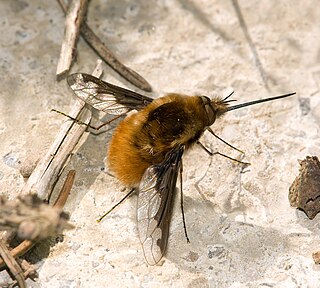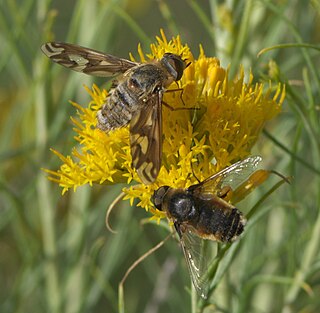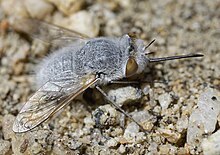
The Bombyliidae are a family of flies, commonly known as bee flies. Some are colloquially known as bomber flies. Adults generally feed on nectar and pollen, some being important pollinators. Larvae are mostly parasitoids of other insects.

Poecilanthrax willistonii, Williston's bee fly or sand dune bee fly, is a member of the Bombyliidae insect family. This family includes the bee flies, true flies that have developed Batesian mimicry characteristics to avoid predators. That is, they look like bees because that helps them avoid bee-wary predators, but they lack stingers.
Bombylius albicapillus is a species of bee fly in the family Bombyliidae. It occurs in western North America.
Exoprosopa parda is a species of bee fly in the family Bombyliidae.

Thevenetimyia speciosa is a species of bee fly in the family Bombyliidae. It is known from Arizona.
Pantarbes is a genus of bee flies in the family Bombyliidae. There are six described species in Pantarbes.
Pantarbes earinus is a species of bee fly in the family Bombyliidae. It is found in western North America, from British Columbia, Canada to New Mexico in the United States.
Lepidanthrax rauchi is a species of bee fly in the family Bombyliidae. It is found in Mexico and Arizona.
Lepidophora vetusta is a species of bee fly in the family Bombyliidae. It is found in Texas, Mexico, and Central America as far south as Costa Rica.
Stonyx clelia is a species of bee fly in the family Bombyliidae. It is known from Mexico and Arizona.
Amphicosmus arizonensis is a species of bee fly in the family Bombyliidae. It is known from Arizona.
Neodiplocampta mirella is a species of bee fly in the family Bombyliidae. It is known from California.
Anastoechus melanohalteralis is a species of bee fly in the family Bombyliidae. It is found in Alberta, Canada, and across the western and central United States. Its larvae are predators of grasshopper eggs.
Lepidanthrax disjunctus is a species of bee fly in the family Bombyliidae. It is known from Mexico and Arizona.
Lepidanthrax eremicus is a species of bee fly in the family Bombyliidae. It is known from California.

Geron is a genus of bee flies in the family Bombyliidae. There are at least 180 described species in the genus Geron, found on every continent except Antarctica.
Pantarbes megistus is a species of bee fly in the family Bombyliidae. It is known only from the northern portion of the Mojave Desert in California.
Xenox habrosus is a species of bee fly in the family Bombyliidae. It is found in Mexico, California, and Arizona.
Hemipenthes inops is a species of bee fly in the family Bombyliidae. It is found in the western United States. It is somewhat unusual compared to other members of the genus Hemipenthes in that its wings are mostly transparent.

Cythereinae is a subfamily of bee flies in the family Bombyliidae. There are about 19 genera and 150 species in Cythereinae.





